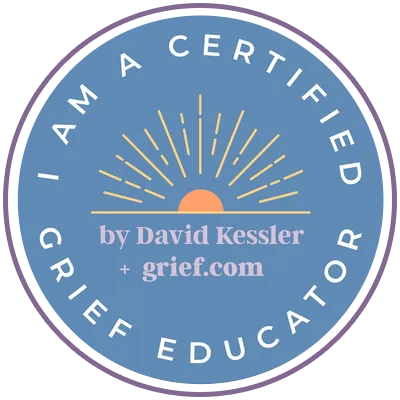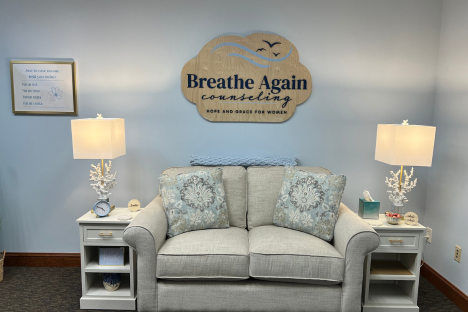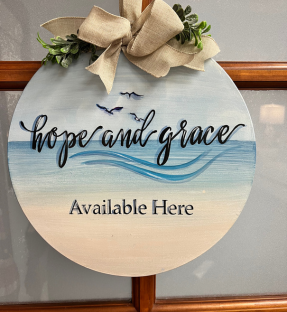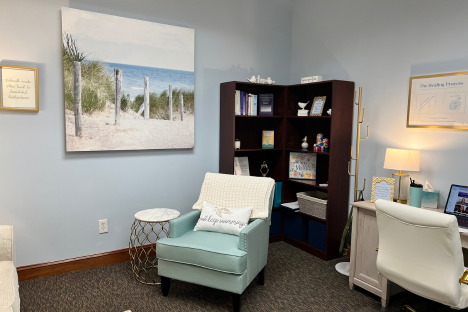welcome to
Breathe Again Counseling
Grief is a club that no one wants to join. It can be a lonely road for many reasons. Wouldn’t it be good to have someone who understands the grief journey to walk alongside you? You don’t have to carry your pain alone.
Welcome to Breathe Again Counseling. On the one hand, I’m so glad that you found your way here, and at the same time, I am so very sorry.
Many times, people think that grief is only experienced due to a death, but grief is a response to any loss. Here are some examples to consider: past trauma/abuse (physical, sexual, emotional, or spiritual), a lost hope or dream, loss of a friendship, family conflict, a health condition, adoption, and miscarriage. Consider that there is grief in all trauma although there isn’t trauma in all grief.
When grief hits, it can literally take your breath away. You’re shocked. You’re confused. You feel overwhelmed. And without realizing it, you can start to use shallow breathing as you try to make it through one more day of painful memories. Stress is a normal part of life. However, too much continued stress can wreak havoc on your mind and body leading to toxic stress which can negatively impact you. Your body may start to hold grief in different places, and you begin to feel stuck.
You can feel as though you are going “crazy”! Perhaps you have noticed memory lapses, or you find that it’s difficult to concentrate. Maybe you feel strong emotions or are numb to your feelings. Do you find that you don’t seem to care about the little things anymore? Everyday choices can seem so frivolous. Do you sleep excessively or does sleep seem to elude you?* These are all normal responses to grief. You aren’t going “crazy”, you are grieving. A recent survey showed that sadness, fatigue, and changes in appetite were the most common effects of grief*.
If you are in deep pain looking for ways to abate your grief, you’ve come to a place where help is available. The truth is, it’s hard to understand the experience of grief until you are in it. You are hurting because you’ve lost something or someone you loved. Grief is always about love. And when you lose what you love or desire, it hurts. It’s painful. When someone dies, you don’t have to let go of your love to release your pain. The love always remains because death does not end a relationship even though it changes drastically.
If you are looking for supportive help and compassionate care as you navigate deep sorrow and painful experiences, reach out today. Click here to connect with me. Let’s see if we might be able to work together to help you begin to breathe deeply and build a life that can be beautiful once again.
*Wright, H. N. (2004). Experiencing grief. B & H Publishing Group.
Need Help Now?
If you are in a crisis or any other person may be in danger – STOP and call 911. Do NOT continue to use this site in place of emergency services. If you need specific resources other than 911, please click here for Help.
Free Resources
For Current Clients

sign up for
Free Resources
about
Wendy Douglas
MA, LCMHCA, NCC
My name is Wendy Douglas, and I am a Licensed Clinical Mental Health Counselor Associate in Greensboro, NC. I am also a Certified Grief Educator. Multiple trainings in grief education have been taken, allowing me to specialize in this area. As a Certified Grief Educator, I have received training through world-renowned grief expert, David Kessler. Additional training in grief, crisis, and trauma response has been completed with the late Dr. H. Norman Wright who was instrumental in helping to develop the GriefShare program.
I specialize in grief, loss, and trauma, helping women ages 21 and up who have experienced unimaginable loss. I work with those who are heartbroken, anxious, and/or depressed as a result. I will help you to honor that which was lost, reclaim parts of yourself that have been hidden, and rebuild a healthy life in a way that allows you to walk your unique journey. Your story may have been dismissed, or perhaps, others have tried to rush you through your grief, not understanding that strong emotions are a part of the healing process. In the beginning stages of grief, you don’t want someone who will try to get you to find meaning; you want someone who will sit with you through the pain and let you feel all the feels. I want you to know that your story matters because you matter (even if that’s hard to believe right now). I give hope that, through the therapeutic relationship and personal grief work, life can be beautiful again. It will be different, but pain will not always be the driving force. It is possible to grieve with more love than pain. If you are struggling and wondering how long you can endure the pain of heartbreak, I am here to help! You don’t have to do this alone…I can work with you to give you the tools you need to treat your whole self and help you to breathe deeply once again. If you feel that you are struggling to hold onto hope, would you consider allowing me to hold hope for you until you can carry it on your own?
I am a member of the American Association of Christian Counselors (AACC) and Equip Coaching Group for Counselors. Level 1 of biblical counselor training has been completed through the Association of Certified Biblical Counselors (ACBC).



My Therapeutic Approach
I firmly believe in the power of the counseling relationship in that it has the potential to serve as a catalyst for individual insight, progressive change, and overall mental health wellness. The foundation of my theoretical orientation lies within humanistic, psychodynamic, and attachment-based therapeutic approaches informed through a trauma lens. As someone who takes an eclectic approach, I tend to draw from cognitive-behavioral therapy (CBT), dialectical behavioral therapy (DBT), and narrative therapy (NT). For clients who have experienced trauma, I sometimes use Polyvagal-informed eye movement desensitization and reprocessing (PV-EMDR) which is an evidence-based treatment for traumatic experiences that incorporates treating your nervous system. I am Level 1 trained in Emotionally Focused Individual Therapy (EFiT) too. Lastly, I integrate Dr. John Townsend’s Character Model, a research-informed, Biblically-based, psychodynamic approach to character diagnosis and treatment regularly in my clinical work. I use the Townsend Model to help clients develop their internal capacities in order to successfully navigate the challenges of life. The form of treatment will depend on the specific needs of the client. If you are looking for a therapist in North Carolina who combines compassionate, person-centered therapy with evidenced-based approaches, please consider reaching out.
A Peek Inside My Office
answers to your
Frequently Asked Questions
Still Have Questions?
Reach out today using the contact form!
Rates & Insurance

Individual Therapy
In-person and telehealth
Initial intake sessions: $160
Individual sessions, 45-50 minutes: $150

Group Offerings
with Peer Support
Cost for groups varies based on the type/length of the group. Please click here to see a list of available groups.
Insurance
I am a private pay provider and DO NOT accept insurance. I am also considered an out-of-network provider. However, a superbill may be requested for you to submit to your insurance provider.
Out-of-network services may be covered in full or in part depending on your current health coverage or employee benefits plan. Please contact your provider to verify how your plan reimburses you for counseling services. Many times, the number is listed on the back of your insurance card.
Here are some questions to consider asking your insurance provider to help determine your out-of-network benefits:
Payment
I accept credit cards (Visa, Mastercard, American Express) and cash as forms of payment. I also accept flexible spending accounts (FSA) or health savings accounts (HSA) if you have one. I do require that a valid credit card be kept on file for all clients. Credit cards are charged the morning of the appointment (unless other arrangements have been made in advance – i.e., paying cash) so that if there is a problem, it can be taken care of before the scheduled appointment time.
“When we are no longer able to change a situation…we are challenged to change ourselves.”
“If we can share our story with someone who responds with empathy and understanding, shame can’t survive.”
“The Lord is close to the brokenhearted and saves those who are crushed in spirit.”
* Frankl, V. E. (2004). Man’s search for meaning: The classic tribute to hope from the Holocaust. Rider. (Original work published 1946)
* Brown, B. (2012). Daring greatly: How the courage to be vulnerable transforms the way we live, love, parent, and lead. Avery.
* The Holy Bible, New International Version. (1984). Zondervan Publishing House.







